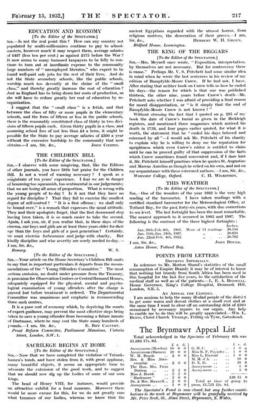EDUCATION AND ECONOMY [To Me Editor 'of the SPECTATOR.] SIR,—Is
not the real point this ? How can any country not populated by multi-millionaires continue to pay to school- masters, however much' it may respect them; average salaries of 1437 (less ten per cent.) as- against £175 before the War ? It now seems to many harassed taxpayers to be folly to con- tinue to turn out at inordinate expense to the community large numbers of " unemployed literates," who expect to be found well-paid safe jobs for the rest of their lives. And do not the State secondary schools, like the public schools, worship much too devoutly at the shrine of the " small class,"- and thereby greatly increase the cost of education ? Just as England has to bring down her costs of production, so she will have to reduce greatly her cost of education by re- Organization.
I suggest that the " small class " is a fetish, and that between- the class of fifty or more pupils in the elementary schools, and the form of-fifteen or less in the public schools, there is the reasonably constituted class of thirty in two divi- sions of fifteen pupils each. Given thirty pupils in a class, and assuming school fees of not less than £4 a term, it might be possible for the State to pay average salaries of £300 a year without the excessive hardship to the community that now






































 Previous page
Previous page